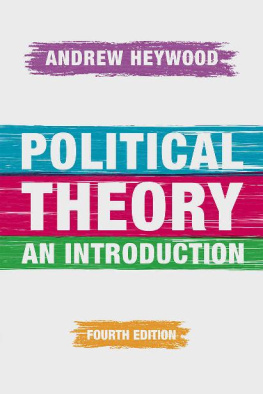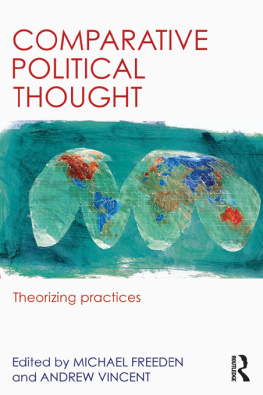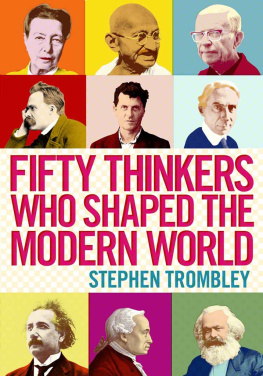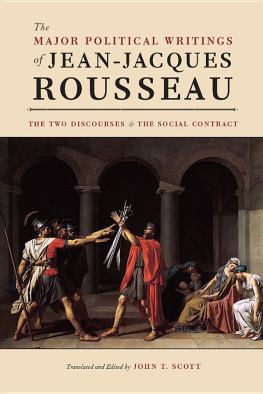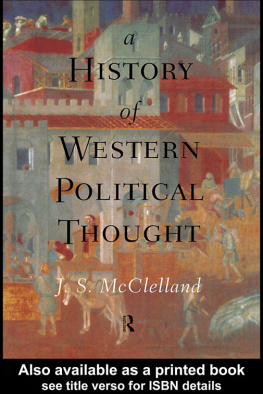Bernstein came from a Jewish working-class background in Berlin. He left school early and worked in a bank. From the age of nineteen he was involved in socialist politics and he became an ardent Marxist. In 1878 Bismarck banned the German Social Democratic Party (SPD) and Bernstein went into exile in Switzerland. There he took over the editorship of the partys official journal, The Social Democrat , which he edited until 1890. He was close to other Marxist exiles in Switzerland, including Karl Kautsky, the SPDs leading theorist and chief upholder of orthodox Marxism. Bernstein made several visits to England, meeting Marx and Engels, and when he was deported from Switzerland in 1887 he settled in London for the next thirteen years. He became a close friend of Engels and was an executor of his will.
Bernstein was at this time a thoroughly orthodox Marxist and in 1891 he and Kautsky wrote the new Marxist programme for the SPD. He shared Engels belief that while revolution was the ultimate goal, the party must, in the meanwhile, remain alive and vigorous by successfully representing the working class and making gains that would benefit it. However, such achievements could only be temporary. They were not good or bad in themselves, but worthwhile only in so far as they contributed to the ultimate goal. It was, therefore, important for Engels that in pursuing this policy the party did not lose sight of its true revolutionary objective, which gave point and purpose to everything the party did; in his capacity as editor of the chief party organ, Bernstein strove to ensure this did not happen. It was only after the death of Engels in 1895 that Bernsteins ideas began to change.
While in Britain Bernstein also associated with the Fabians, who influenced his thinking and with whom he maintained contact after his return to Germany in 1901. In addition to the Fabians, British conditions convinced him that the single great leap from capitalism to socialism was an ideological illusion, that capitalism was simply not going to collapse under the weight of its own contradictions, and that socialism could perfectly well come about through incremental reform gained through democratic pressure. On this basis he constructed a system that modified a number of Marxisms basic ideas. He set out his new thinking in a series of articles in Kautskys theoretical journal The New Age , beginning in 1896. The ideas were condemned at the party conference at Stuttgart in 1898 by Kautsky, Rosa Luxemburg and others, before Bernstein was able to return to Germany. It was Kautsky who urged Bernstein to clarify his ideas, which resulted in the book, The Preconditions of Socialism and the Tasks of Social Democracy (1899; previously translated as Evolutionary Socialism ). It became the fundamental revisionist text and the centre of furious controversy, embracing the whole European social democratic movement, which became divided between two camps. A host of anti-revisionist resolutions and polemics followed, as most of the party theorists were ranged against Bernstein. However, revisionism steadily gained ground among party memberships and trade unions, where it often simply articulated pre-existing attitudes.
A year after his return to Germany, Bernstein was elected as a Reichstag deputy for Breslau, which he represented from 1902 to 1918 and from 1920 to 1928. He became progressively more outspoken in his rejection of Marxist ideas, and by 1914 had more in common with liberal reformers than with orthodox Marxists. When war broke out in 1914, Bernstein was among the few social democrats who opposed the war, and subsequently joined a breakaway party along with Kautsky. He rejoined the SPD after the war and helped draft its first programme. He was the real founder of the non communist social democracy of the inter-war years. He died in Berlin in 1932.
The Revisionist Controversy was a profound split over theory, but Bernstein would have had little impact had there not already been developments and divisions over policy and tactics, particularly in the light of the failure of Marxs predictions. By 1900 the German workers had enjoyed considerable success over many years in improving living standards, increasing welfare and reducing the length of the working day. Inevitably in these circumstances a large section of the party leadership increasingly saw the task of the party as building on these gains and ignoring the prospect of future revolution, as socialists in Britain were successfully doing. Many local and trade union representatives had become indifferent to the ultimate goal and tacitly assumed a model of bringing in socialism gradually through reform.
The claim of Marxism, especially emphasised by the orthodox, was that it was scientific socialism. Bernstein argues that to treat Marxs ideas as sacrosanct and based on authority is not scientific. Time had shown that Marx and Engels had got some things wrong and as a consequence some of their basic ideas needed revision. He accepted that they were correct in pointing to the potentially fatal contradictions within capitalism and predicting on the basis of their initial analysis that capitalism would indeed eventually collapse of its own accord. But what he went on to say was that subsequent research had demonstrated that this was only a tendency that could be, and in fact had been, counteracted by other factors, without actually eliminating the contradictions. Marx and Engels had the evidence for this conclusion but ignored it. For example, in their later writings they had come to realise that economics was only the determining factor in the last analysis. This should have led them to talk more of tendencies in their predictions. Instead they made their mat erialist theory of history ever more deterministic. This was because they remained under the spell of the Hegelian dialectic, their own version of which they erroneously took to be scientific but which often prevented them from seeing the implications of their own research.
Bernstein held the influence of Hegel responsible for much of what he thought wrong with Marxism. Above all he blamed Hegels tendency to predict the course of history a priori , on the basis of abstract metaphysical categories that saw people merely as instruments of grand dialectical movements and paid little attention to empirical facts. It was this method that led Marx to adopt an erroneous historical determinism, and to rely on a single mode of explanation: the economic. Hegelianism also led Marx, according to Bernstein, to the notion of a dramatic qualitative leap from capitalism to socialism: hence the role of violent revolution in Marxism. In fact Bernstein sees Marx as trying to straddle two different and incompatible versions of socialism. On the one hand, there is the constructive evolutionary version developed by socialist sects and utopian writers and by workers organisations with the aim of establishing a new economic system that would emancipate society. The other version was for instant socialism through the revolutionary seizure of the property of the governing and exploiting classes. This version was terroristic, conspiratorial and destructive; it was only justified if the first version was impossible, which in fact was not the case.
Bernstein rejected Marxs economics, arguing that the labour theory of value simply did not work. As a consequence, his predictions about the concentration of capital, class polarisation, immiseration and a great revolutionary leap to socialism were quite wrong. Wealth was not being concentrated as he predicted but was spreading, with ever more property owners. Class polarisation was not happening because the development of the economy and technology was such that ever greater differentiation was occurring in all classes of society. Furthermore, a major crisis bringing about a collapse of capitalism was becoming less likely, not more so, because capitalism was becoming ever more financially sophisticated.




